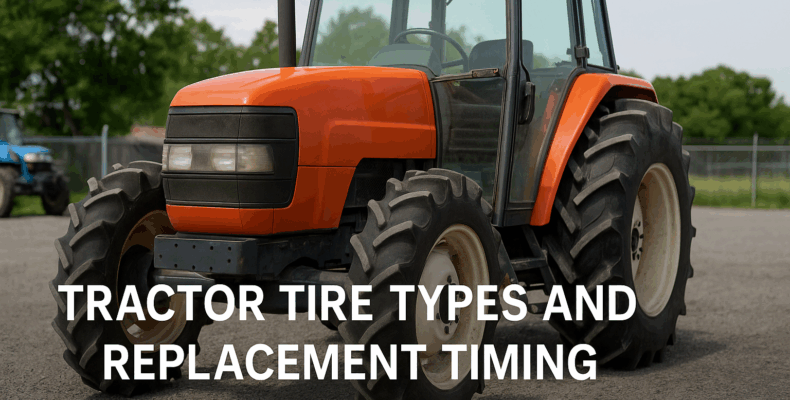Tractor Tire Types and Replacement Timing
When it comes to Japanese used tractors, one of the most important maintenance areas is the condition of the tires. The right tire type ensures not only fuel efficiency and traction but also safety and long-term productivity on the farm. Therefore, understanding the different types of tractor tires and when to replace them is essential for every farmer and agribusiness owner.
Main Types of Tractor Tires
-
Agricultural Lug Tires (R1):
These tires are designed for maximum traction in muddy or soft soil conditions. Farmers who work in rice paddies or wet fields prefer R1 tires because they provide grip even in slippery environments. -
Turf Tires (R3):
R3 tires are commonly used on lawns, golf courses, or farms where protecting the ground is important. They have a shallower tread pattern to minimize soil damage while still offering reliable traction. -
Industrial Tires (R4):
R4 tires are a hybrid solution. They provide durability on hard surfaces like roads while still offering some traction in fields. These are perfect for tractors used in construction, landscaping, and mixed farming tasks.
When Should Tractor Tires Be Replaced?
Tractor tires can last for years, but timely replacement prevents costly accidents and inefficiencies. Here are clear signs that it’s time to replace your tractor tires:
-
Worn-out Tread: Reduced depth makes traction poor, especially in muddy or hilly areas.
-
Cracks on Sidewalls: Exposure to sun and chemicals weakens the tire structure.
-
Uneven Wear: This may indicate improper inflation or misalignment.
-
Frequent Punctures: If repairs are happening too often, a replacement is more cost-effective.
Moreover, many experts recommend checking tractor tires every 1,000 hours of operation. Although they can last longer, preventative replacement ensures continuous performance and safety.
Why Japanese Tractors Lead in Tire Durability
Japanese tractors, whether from Kubota, Yanmar, Iseki, or Mitsubishi, are globally respected for their balanced design and tire longevity. Manufacturers engineer their tractors with tires that match the machine’s horsepower and weight, which improves both fuel efficiency and overall performance.
Furthermore, the used tractors exported from Japan often come with well-maintained tires, thanks to Japan’s strict agricultural standards. This makes them a cost-effective and reliable option for international buyers.
Finding Reliable Exporters for Japanese Tractors
While tractors themselves are durable, choosing the right export partner makes the import process smooth. A trustworthy exporter ensures that tractors are inspected, shipped safely, and delivered with transparency.
For international buyers, we recommend checking this resource:
👉 Top 5 Trusted Japanese Used Truck Exporters for Global Buyers
This guide introduces five professional exporters in Japan who specialize in used trucks, buses, and tractors. Their proven reliability guarantees a safer and easier buying experience.
Final Thoughts
In conclusion, selecting the right tractor tire type and replacing it at the correct time ensures maximum efficiency in farming. Combined with the durability of Japanese used tractors, proper tire care contributes to long-term agricultural success.
Farmers worldwide continue to trust Japanese tractors because of their quality, cost-effectiveness, and superior engineering. Therefore, if you are planning to import one, make sure to partner with a reliable exporter for the best results.
